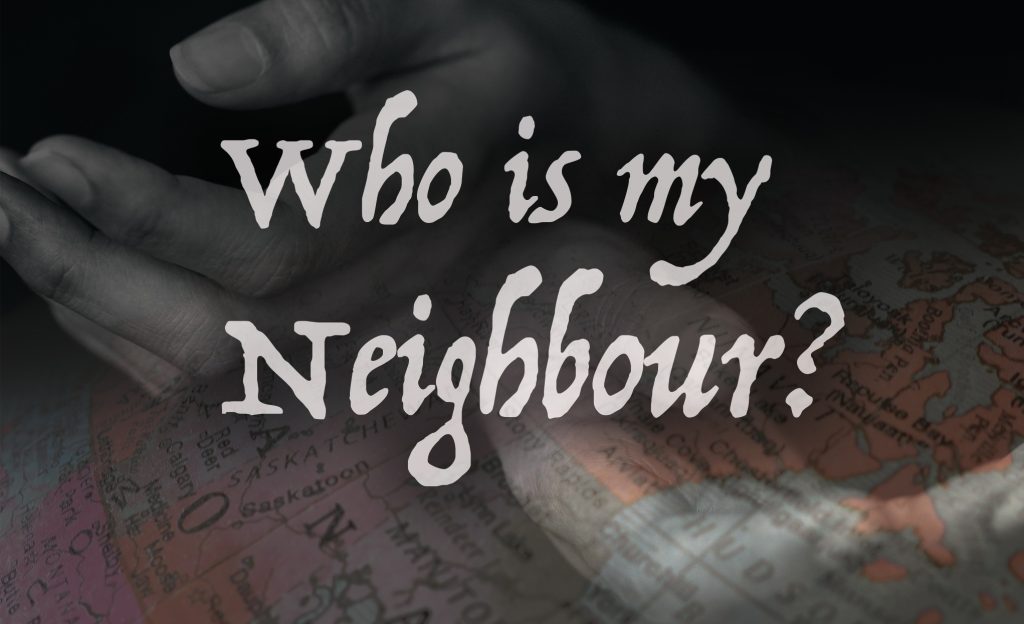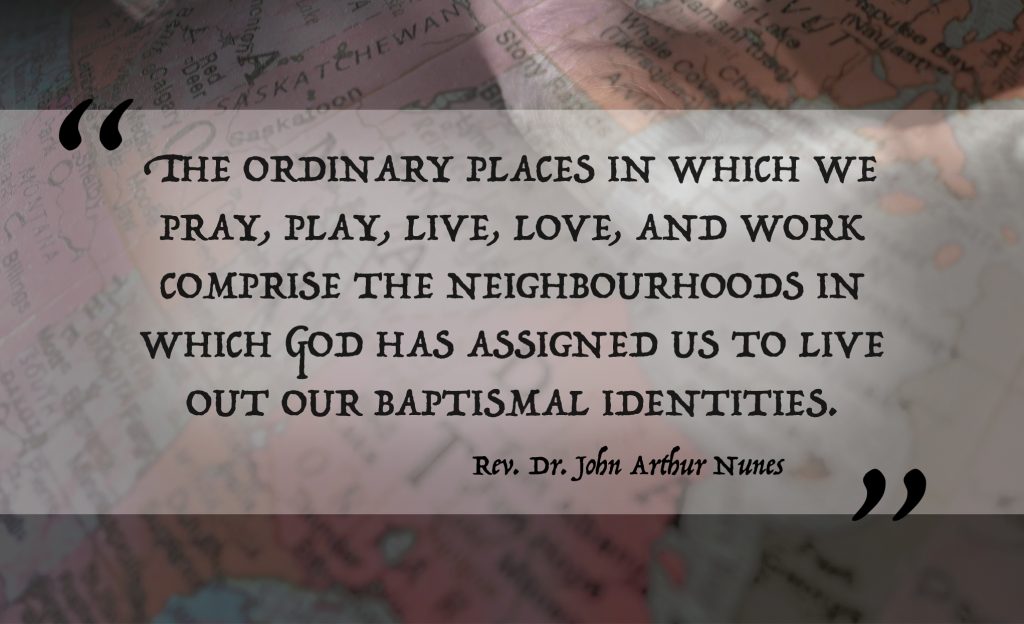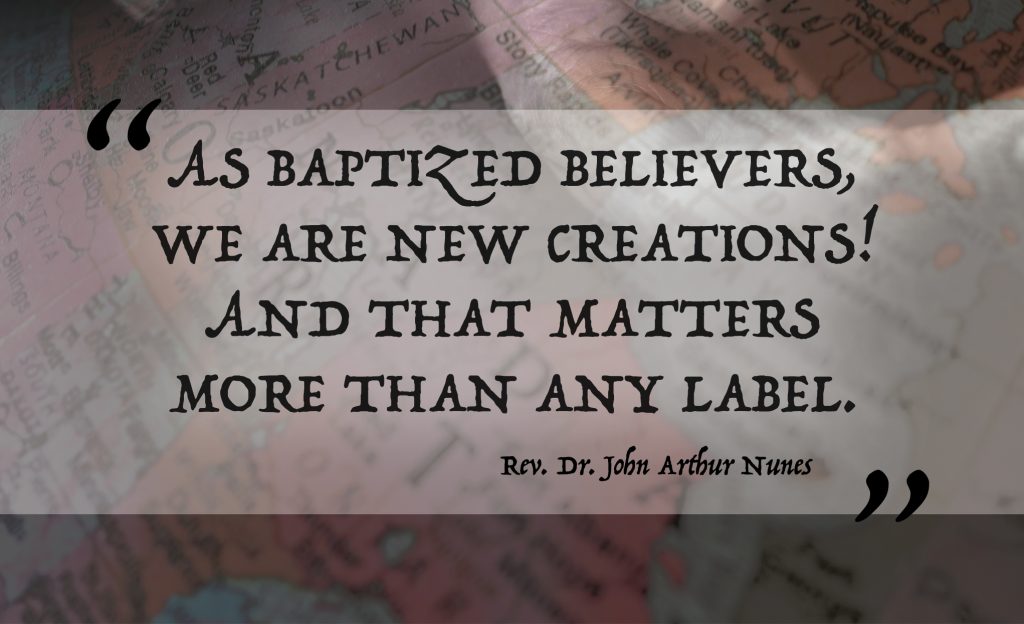Who is my neighbour?

by John Arthur Nunes
As if the loneliness of isolation weren’t enough, now we are gripped by the fear of anarchy and what feels to some like the collapse of western civilization. As tough as these times seem, I believe that the Holy Spirit relentlessly is present to help the Church navigate with confidence and hope these difficult days: “We are not of those who shrink back and are destroyed, but of those who have faith and preserve their souls” (Hebrews 10:39).
The twin crises of COVID-19 and rising mainstream awareness of racial injustice have tested our faith and rattled our settled ideas of normalcy. From Port of Spain, Trinidad to Uranium City, Saskatchewan life on our continent is challenged. Yes, I say stretching from the Caribbean, because people from Panama to Greenland geographically-speaking are our North American “neighbours.” Our current moment—whether because of social distancing or social unrest—retrieves for us an ancient question with biblical precedent: “Who is my neighbour?” (Luke 10).
Reimagining Neighbourliness
When I attended Concordia Lutheran Theological Seminary (CLTS – St. Catharines, Ontario) in the late 1980s, Dean Roger Humann led a spiritual retreat based on Dietrich Bonhoeffer’s work Life Together. How can communities of faith ground our lives together in the place where grace is funded? Humann proposed, only with Christ at the centre! I remember our discussions including this volume’s cautionary note: that there was a destructive power when humans wrongly love even good things. For example, lovers of community, and nowadays, lovers even of diversity end up destroying what they love. Those, on the other hand, who reserve their love for Jesus Christ fortify community.
That principle has stuck with me and worked for me everywhere I’ve been in the ensuing thirty-plus years. Truth endures, doesn’t it? My point is, as we ourselves endure our hard struggles (Hebrews 10:32), we do not need novel strategies; we do need to do old things in new ways, and answer ancient questions, like “Who is my neighbor?” with faithful reimagination.
Our renewed neighbourliness arises only as we continue to orbit our lives around the source and summit of our faith, Jesus Christ. He is the axis that holds all things together (Colossians 1:17). Through the inevitable zigzag course of our days, we hold firmly to the One who holds us in “the confession of our hope without wavering” (Hebrews 10:23). How do we keep being held? By participating regularly in God’s Word, in the Sacraments, and in the fellowship of the faithful. By dwelling in Christ, we will reinforce our habits of faith during these trying times even as we discover innovative ways to be forces for good and for God in increasingly diversified communities. To be the witnesses for peace and the workers for justice we are called to be, we must first “live and move and have our being” (Acts 17:28) in the One who calls us.
Since human persons are the crown of creation, all people are offered the saving gift that Jesus Christ lived, died, and rose to procure. Humans are able, by grace through faith, to uniquely know and love their Creator. Therefore, we regard all persons as our neighbours—without any exclusions or exceptions! We value all persons as bearers of the dignity accredited to those both made in the image of God, and, in whom, as believers in Christ, the image will be fully restored. Finally, we anticipate the renewal of creation, the healing of the nations (Revelation 22:2), where race is finally and fully transcended.
North American society seems to be moving in the opposite direction, as we increasingly dishonour, disregard, and disrespect our neighbours with blatant brutality. Social media tends to aggravate our rage and outrageousness. Stuck in a painful state of hyperpartisanship, we demonize each other and impose demands that are non-nuanced and non-negotiable. As religious faith fades, politics gains an inflated sense of religious ferocity. Even among those who profess belief, theology too often gets twisted to form a thin veneer of proof passages as cover for their group’s cultural ideology. We are meant for more than this as a people and as a Church. If we still possess the will to pursue a pathway forward, it will need to include a new neighbourliness led by Christians: respectful listening, principled civility, reasoned dialogue, mutual sacrifice, decision-making with an eye toward the common good, and as James Hankins from Harvard University puts it much better than I: “the ability to recognize the value of what others value.”
Humans are able, by grace through faith, to uniquely know and love their Creator. Therefore, we regard all persons as our neighbours—without any exclusions or exceptions! We value all persons as bearers of the dignity accredited to those both made in the image of God, and, in whom, as believers in Christ, the image will be fully restored.
I palpably remember as a student how proudly I admired the neighbourliness expressed in the old CLTS Academic Calendar. I was magnetized by what these words suggested as possible: that St. Catharines was located near the urban centers of Toronto, Hamilton, and Buffalo, New York, and that the area congregations were reflective of “the ethnic and linguistic diversity that is typically Canadian.” What a bracing vision, to celebrate pluralism as “typical,” an indubitable fact.

Race as Fiction. Racism as Fact.
The most recent racial unrest in the United States has captured the attention of the mainstream culture in North American life, a stratum in which most Lutherans are located. Many are becoming more aware of what others have long known—the persistence of the structural evil of slavery, Jim Crow segregation, and the chronic lack of access afforded too many African-Americans. Many are recognizing the gargantuan work yet to be done in addressing systemic corruption, unequal economic opportunity, urban violence, mass incarceration, and the treatment of minority neighbours.
There may be similar opportunities in Canada among so-called minorities. I say “so-called” because Black, Indigenous, and People of Colour (BIPOC) comprise the vast majority of the world’s 7.8 billion people—conservatively 80 percent. The proportion of “minorities” in the U.S. and Canada will only grow as time goes on. Pew Research already reports that the most common age for white people in the United States today is 58, while for “minorities” it is 27.
It has always struck me as ironic that the majority of the world’s population qualifies as “minority.” Obviously, this term refers more to power dynamics than numerical demographics.
It has always struck me as ironic that the majority of the world’s population qualifies as “minority.” Obviously, this term refers more to power dynamics than numerical demographics. Because of this, I have an academic friend who uses the term minoritized rather than minority. He is referring to groups of people who have been assigned minority status. What makes this more ironic for Christians is that race is a theological and biological fiction. Genetic differences are as significant within so-called races as they are between so-called races. Yet, racism is a fact. Racism makes negative judgments about human worth, intelligence, or superiority based on phenotypes, that is, “organic, genetically transmitted differences (whether real or imagined) between human groups” (LCMS CTCR report on “Racism and the Church”).
Shattering Stereotypes
One opportunity for Christians in Canada to engage in the work of social justice and evangelization is among our First Nations’ neighbours. The word “neighbour” derives historically from near-dweller; to be a neighbour requires proximity, getting close to others in order to get to know them. Social distancing is the opposite of neighbouring.
Rhonda Kelman is the Executive Director of BC Mission Boat Society. She described for me in a recent Zoom conversation what could be acquired only from getting close to those who are different. Her “stereotypes were shattered” through her work among First Nations peoples living in remote communities along Canada’s British Columbian coast. As she shares the love of Jesus in word and deed, she “listens and learns,” and is awakened to the many false assumptions that people have regarding the religious practices of these communities. “It’s not about animal worship,” Kelman maintains, “I’ve heard [First Nations] people ask, ‘How can I have my culture and Jesus at the same time?’”
In other words, how are we to understand the ways in which culture and Christianity intersect? While becoming Christian certainly implies entering into a reverential framework that is distinct from this world, it also always entails cultural forms that are of this world—like language, music, ways of relating to one another, and even notions about time. During this moment of rising intercultural consciousness, we have a chance to learn about our own cultural blind-spots that falsely blur culture and theology. No matter who we are, our way cannot be the only way to come to the only One who is the Way, the Truth, and the Life (John 1:14).
Kelman speaks glowingly about experiencing welcome and hospitality among her First Nations neighbours. “I am amazed that we are invited and asked to go into their communities, especially in light of what they have suffered from church-based Residential Schools: sexually, physically, emotionally, having everything stripped away from them, not even being allowed to use their language.”
It is heartbreaking that Inuit people, for example, have experienced intergeneration trauma which contributes to the highest suicide rates in the world, as Helen Epstein writes in The New York Review of Books, and that in some communities “over half the population uses drugs… including anything sniffable: starter fluid, spray paint, nails polish and gasoline.” Who is my neighbour?

Three Splashes of Inclusion
Irrespective of your politics, Canada seems historically to have striven to be a place of welcome and inclusion. As the former president of Lutheran World Relief, I had the opportunity to travel the world, meeting and getting to know many global neighbours, especially those living in poverty. As a whole, Canada seems unique in valuing hospitality toward new neighbours. My family was blessed to be welcomed to Canada from Jamaica in the 1960s, and then to Pilgrim, Hamilton in the early 1970s.
Sadly, some of this spirit seems to be dissipating. Perhaps this is in reaction to the ideological pressures of aggressive progressives. Perhaps it’s due to the nostalgic streak among some conservative types pining for a mythical era of monochromatic simplicity. Perhaps it’s an unhealthy influence from your politically divided neighbours to the south.
Whatever the socio-political motive, our identity in Christ’s mystical body must transcend categorization. As baptized believers, we are new creations! And that matters more than any label. Likewise, we have a new view of our neighbours, seeing them not merely as labelable categories. Reborn, “we regard no one according to the flesh” (2 Corinthians 5:16). What God does for us in three splashes of water obliterates all distinctions. Who we are daily remade to be in the name of Father, Son, and Spirit outweighs any category like Métis, fundamentalist, racist, single-parent, Quebecois, steelworker, Latina, divorcee, Marxist, bishop, learning-disabled, or any of the pigeonholes in which we find ourselves placed. We are called into the world from that eternal-life-giving font by the perfect love that drives out fear (1 John 4:18).
Despite what feels these days like chaos and crisis, the Holy Spirit keeps our eyes riveted on Jesus Christ. The ordinary places in which we pray, play, live, love, and work comprise the neighbourhoods in which God has assigned us to live out our baptismal identities. We follow our Redeemer and Rabbi who was, as my former professor Rev. Dr. John R. Stephenson eloquently puts it, “the carpenter’s son, becoming not a garrulous member of the chattering classes, not a businessman in search of quick profit, not even mayor of the town, but a quiet, methodical, reliable carpenter alert to the needs of His neighbours.”
———————
Rev. Dr. John Arthur Nunes is President of Concordia College (Bronxville, New York).





